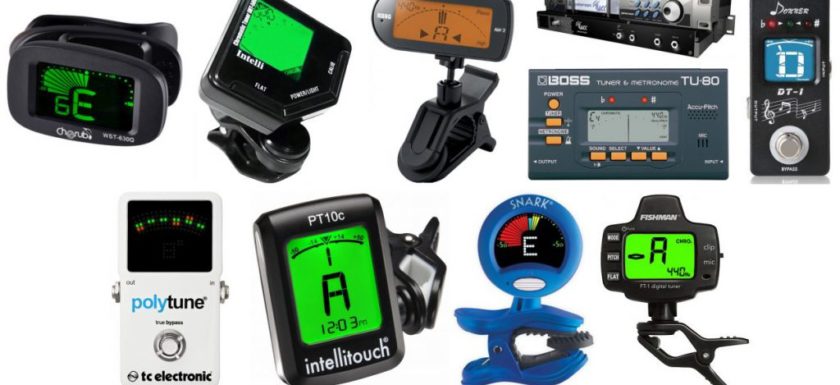For those of us out there that have not been blessed (or cursed as some would claim) with perfect pitch, a tuner can be your best friend or your worst nightmare. Choosing the right one is absolutely essential if you want to sound your best no matter the environment and no matter the ensemble.
What are the Different Kinds of Tuners?
Let’s focus on perhaps the largest family of tuners: the guitar tuners. There are 7 important categories of then as defined by E-Home Recording Studio.
- Handheld tuners
- Clip-on Tuners
- Pedal Tuners
- Polyphonic Tuners
- Rack Tuners
- Sound Hole Tuners
- App Tuners
Each of these tuners has its ups and downs and it’s important to understand what advantages you’re giving up or picking up when purchasing one.
Handheld Tuners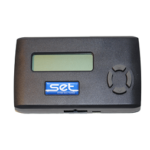
These guys are just what they sound like. Small tuning technology that can fit in the palm of your hand. Given the size of the original strobe tuners, folks were reasonably excited when these handheld tuners became available. Are they as spot-on accurate? No, they aren’t. However, they are accurate enough for most people and make up for their shortcomings in their affordability, compact size, and convenience.
Clip-on Tuners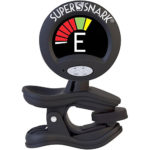
Clip-on tuners are some of my personal favorites. As a classical musician, these tuners are fantastic for tuning in a large environment as they easily slip onto the bell of brass instruments, clarinets, saxophones, and even the stand for the flutes in the room. These ones work great for guitars too. They’re easy to use on acoustic or electric guitars. Most come equipped with a vibration sensor so they do not rely on input from the microphone alone. Small, compact, accurate and affordable. I never leave for a gig without one.
Pedal Tuners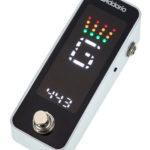
Calling all the plugged-in musicians in the room. These tuners allow you to tune in the heat of the moment without needing to plug into any additional channels. Whats more, combine it with a mute pedal and discretion is now the name of your game, even if you’re onstage in front of a full house. These come in so many different styles and features that you really do have to do some deep digging to find out the one that works best for your set up.
Polyphonic Tuners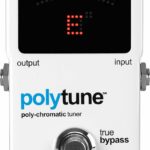
These are new tuner breed. Sick of sitting and plucking string after string? Now tune your whole guitar in one strum. These are the fancy tuners for the people that need to tune complex overtones and tune them quickly. These tuners normally are very expensive and not for the average Joe. However, these are the ones that make for impressive knowledge in the tuner trivia world. The top of the line of this type of tuner comes in at $3700 and is normally used by technicians tuning complex musical instruments. But hey, the more you know right?
Rack Tuners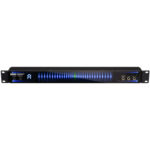
These 19″ tuners are the ones for the musicians out there who primarily use a rack setup. These ones are built to stack in with the rest of your gear allowing for easy transportation and a clean performance setup. Looking for a bonus? These tuners come with a bunch of additional features. Beyond that, these are quite useful for studio use as they often have multiple inputs and play nicely in large setups. This kind of tuner can run between $99-$400 generally so be sure that this is the way that you want to go before investing.
Sound Hole Tuners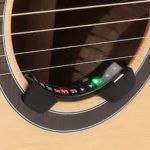
This one is specifically for guitar players. Beyond that, this tool is for the guitar players that don’t want to deal with one more small thing to keep track of. These tuners mount inside the guitar and are a permanent fixture. No more having to deal with small easy to lose tuners that have a tendency to disappear. More expensive models allow for silent tuning which gives you the freedom to prep even in the loudest of environments.
App Tuners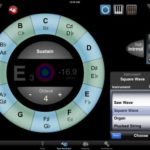
There are times when the only thing you have on you is a smartphone. I can say from personal experience that my app tuner has saved me in many a pinch when I couldn’t get to my case. There are so many app tuners on the market and many of them are free. My personal recommendation: TonalEnergy Tuner. This tuning app cost $4 in the app store and it is some of the best money I have ever spent. In addition to being a quite accurate tuner, this app provides a metronome, tonal analyzer, drone, and much more. It even comes with a transposition feature for all instruments not tuning in the key of C. Highly recommended.
Thoughts?
At the end of the day, every person has a system that is right for them. Explore the options of what goes in your gear bag. Something this essential, you want to make sure that you have found your perfect match.
Check out the article from E Home Recording Studio to see some of their top recommended products.
Tell us about your favorite tuners and what has worked best for you over the years in the comments.
